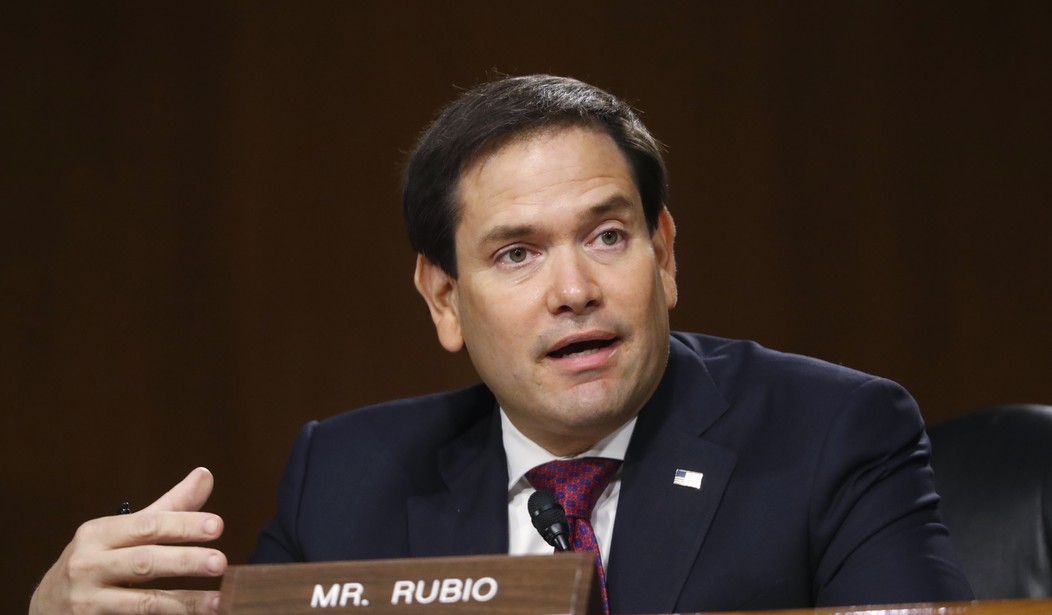On Tuesday, Florida GOP Sen. Marco Rubio questioned the National Institute of Health’s Acting Director Dr. Lawrence Tabak on the safety of puberty blockers on minors during a Senate Appropriations Subcommittee on Labor, Health and Human Services hearing. During the hearing, Tabak admitted there are no long-term studies on the risks of off-label use of puberty blockers on minors.
“The Biden Administration and others in the policy realm have been actively promoting and supporting the use of things like puberty blockers and hormone therapy for young boys and girls,” Rubio said to Tabak.
“I want to limit my question to minors, for what they [Biden administration] have termed ‘gender transforming care.’ That's not an FDA-approved use for puberty blockers and hormone therapy, I don't believe, in any people, but especially in minors. So, as the NIH is America's medical research agency, what work have we done at NIH, what work’s been done, to determine if this non FDA-approved use of these medicines, this off-label use of these medicines, is appropriate for minors seeking ‘gender transforming care?’” Rubio asked.
“NIH funds a small number of observational studies to gather the data on the effects of treatments that transgender youth and their parents have chosen. And there are also a small number of studies that describe the health issues and risks, including HIV, that are unique to to these transgender youth. But all of the research in this space is observational. We do no interventional work,” Tabak answered.
“It’s one thing if it’s a decision made by an adult, right? And, especially given the irreversible nature of some of these treatments, isn't there some wisdom in the notion that before policymakers are out there promoting the off-label use of medications that lead to permanent changes, that there be some more research done on its impact, you know, five, ten, 15, 20 years from now?” Rubio pressed.
Recommended
“Transgender youth are more vulnerable to depression, anxiety, engaging in self-harm, and so it is important that we examine and evaluate the potential effects of these treatments. Researchers are observing longer-term psychological impact of these protocols. And so, by looking at individuals, transgender youth with and without histories of puberty suppression, we will be able to better answer the types of questions that you're posing,” Tabak answered.
“That’s my point. My point is, we don’t know what its long term implications are when we weight the cost and the benefits,” Rubio said. “The FDA hasn’t approved this and yet we have policymakers promoting it, and I think that’s an important point.”
“We clearly don’t want anybody harming themselves, things of this nature, but we don’t know…these policy decisions are being made on the basis of observational guidance and, by your own admission, without any sort of long-term trajectory on its holistic impact.”
Sen. Rubio forces NIH to admit there are no long-term safety studies for the off-label use of puberty blockers by children. Watch ?? pic.twitter.com/aPUe9z8dnR
— Senator Rubio Press (@SenRubioPress) May 17, 2022
On “Transgender Day of Visibility” in March, the Biden administration released guidance promoting the use of “gender-affirming” care for minors, as Townhall covered.
The United States Department of Health and Human Services’ Office of Population Affairs released a document outlining how “gender-affirming care is crucial to overall health and well-being” for children and adolescents. According to the OPA, “gender-affirming care” allows minors to focus on “social transitions” and boosts their confidence while “navigating the healthcare system.”
In addition, the OPA claimed in the release that “research demonstrates that gender-affirming care improves the mental health and overall well-being of gender diverse children and adolescents.” The four types of “gender-affirming” care it outlined were social affirmation, puberty blockers, hormone therapy, and “gender-affirming” surgeries, which includes sex reassignment surgery.
On the same day, the Substance Abuse and Mental Health Services Administration's National Child Traumatic Stress Network, another branch of the HHS, released a parallel document called “Gender-Affirming Care Is Trauma-Informed Care.”
“Providing gender-affirming care is neither child maltreatment nor malpractice,” the NCTSN document stated. "It may include evidence-based interventions such as puberty blockers and gender-affirming hormones." It added that “gender-affirming care should not be used to deny care or separate families working to make the best decisions for the children’s well-being.”
Earlier this month, Townhall reported how Rachel Levine, the United States Assistant Secretary for Health for the U.S. Department of Health and Human Service, brushed off critics of guidance promoting “gender-affirming” health care for minors. Levine is a “transgender” woman born a biological male.
“There is no argument among medical professionals – pediatricians, pediatric endocrinologists, adolescent medicine physicians, adolescent psychiatrists, psychologists, etc. – about the value and the importance of gender-affirming care,” Levine said in an interview with NPR.
Levine’s remarks came shortly after Florida’s Department of Health released guidance on against providing “transgender” minors with “gender-affirming” care, including letting minors “socially” transition.

























Join the conversation as a VIP Member